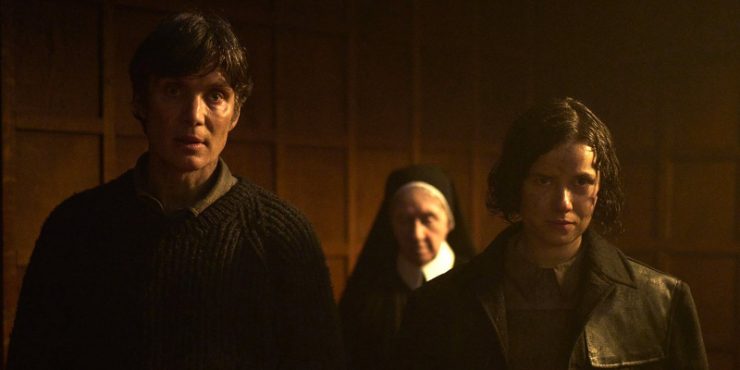Claire Keegan’s fiction is riddled with silences pregnant with foreboding. The rural Irish settings of her books contain characters weathered into submission, accepting the things they cannot change, which is almost everything. In Small Things Like These, her most popular book, a working class man quietly battles within himself over doing the right thing. This requires defying the institutions that reign over everything he knows. Keegan is very good at giving you a relative view of the stakes, helping you understand the circumstances in which seemingly simple decisions are complicated within these provincial Irish towns. In Tim Mielants’s film adaptation, the dramatic density of Keegan’s deceptively simple prose feels flattened by his severe tone. This is serious subject matter, but in drilling it down so hard, he’s lost the story’s heart.
The film is the latest produced by Artists Equity, the production company founded by Ben Affleck and Matt Damon which seeks to give all participants on the making of a film equal share of profits. Their first film, Air, was a surprise box office hit, but since then it’s been straight-to-streaming films that have gotten little viewership (unless you count the Jennifer Lopez Amazon “documentary” This is Me… Now). Actor Cillian Murphy is another producer listed here and he also plays the lead role of Bill Furlong, a coal merchant whose long work days consist of riding his truck filled with bags of coal through the town and performing deliveries, throwing the heavy, dirty bags over his shoulder before dropping them off at various homes and businesses. Every night when he gets home he performs a long ritual of hand and face cleaning, scrubbing all the coal off before sitting at the dinner table where his wife (Eileen Walsh) and four daughters are usually already finished.
One of his more consistent clients is the local convent, a cold and secretive place. As he fills their coal shed he happens to see a young woman being forced into the building by nuns and her mother. The girl screams for mercy before being forced in. The image stays with Bill, who remembers his own mother, Sarah (Agnes O’Casey). Sarah died when Bill was just a young boy but in flashbacks we see that she’s a house servant for a wealthy landowner named Mrs. Wilson (Michelle Fairley). Bill was considered an illegitimate child, with an unknown father, but thanks to Mrs. Wilson’s kindness, Sarah avoided a harsher displacement due to her supposed sins, but she’s still a pariah. His mother’s fate – dead before the age of thirty – colors Bill’s own emotions when he begins to suspect that the convent is an abusive holding place for wayward young women.
The mother superior, Sister Mary (Emily Watson), speaks to Bill with calm malice. When Bill finds another young woman (Zara Devlin) locked in the cold coal shed overnight, he escorts back into the convent where Mary quickly invites him in to tea and cake. In a sequence of intense enmity, Mary speaks politely with tranquility, but the threat is as clear as day. No one gets in the way of the church’s order of things. Everyone from his wife to a local pub owner explains it to Bill the same way – the convent can create more trouble than it’s worth, but Bill is still compelled toward helping these young women. The girl in the coal shed was named Sarah, like his mother, a coincidence too stirring to ignore. As he debates standing up to the monolithic church, Bill also has his family to consider. Money is tight and Christmas gifts will need to be purchased soon.
The tone here is a bit too one-note. Mielants keeps nearly of the abuse of the Magdalene laundry (the name for the Irish asylums that held “fallen women”) off screen, and most of the action is the inner turmoil of Bill’s conscience. Murphy, fresh off his Oscar win for Oppenheimer, is tasked to play the quiet everyman of Bill Furlong. The simmering intensity is nothing new for the Irish actor, but his famously dashing looks do prove difficult to hide under the working class cosplay. Mielants seems primed to mimic the book’s powerful but subtle impacts, but that is not always easy when your blue collar protagonist has the movie star beauty of Murphy. The reality is that without Murphy’s star power, a movie like Small Things Like These probably never gets made, and despite the miscast, his performance is still a powerhouse of interiority.
Emily Watson only gets a handful of scenes as Sister Mary, but they all have an acute power that only she can bring. The veteran actor is tasked with packing oceans of villainy into a small collection of line readings that she pulls off perfectly. Watson and the Sister Mary character are perhaps the only parts of Small Things Like These that really captures the small-scale immensity of Keegan’s book. In 2022, another Keegan novella, Foster, was made into a film called The Quiet Girl – one of the best films of that year. Made in the Irish language, that film also kept the small glimpses of humor much needed to break up the story’s somber circumstance. It’s a delicate balancing act, and difficult to pull off. Mielants’s film is quite handsome, Frank van den Eeden’s cinematography captures both the quaint beauty and the natural harshness of its locale. But the balance isn’t there, and even at a brisk ninety-six minutes, the film is too serious to maintain itself.
Directed by Tim Mielants










